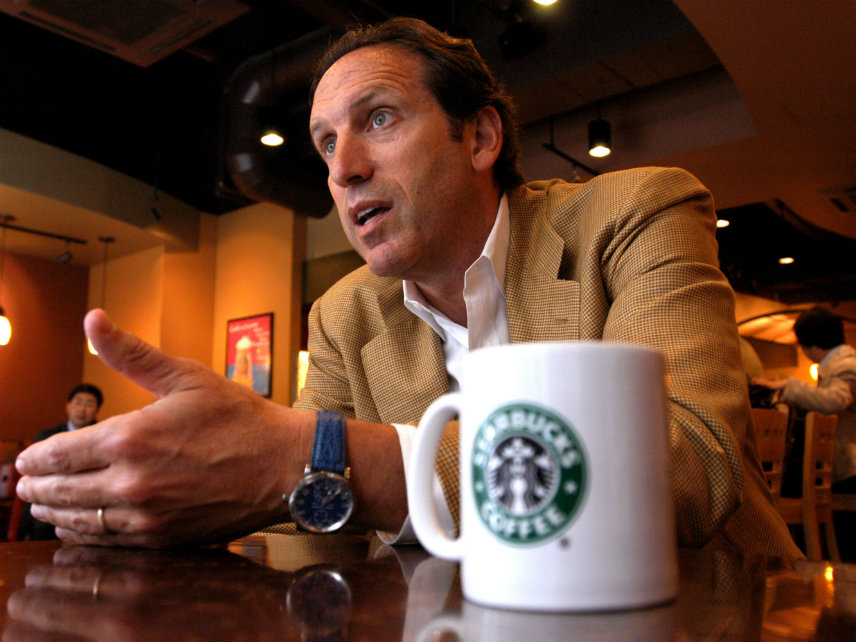Flirting With Presidential Run, Former Starbucks CEO Says America Needs to Address National Debt
"There's no for-profit business in the world that could sustain itself or survive with $20 trillion in debt," says Howard Schultz. "It's just not responsible."

Howard Schultz, the longtime Starbucks executive who helped turn the Seattle-based coffeeshop chain into a globe-dominating brand, has announced that he's stepping down from the company at the end of the month. After flirting with the idea of running for president in 2016, Schultz' decision to step away from Starbucks is fueling talk that he might seek the Democratic nomination in 2020, and the businessman is happily encouraging the speculation.
If Schultz runs, he's sure to face a crowded primary field; you'd be wise to be skeptical about his chances. Still, he's someone worth keeping an eye on, if for no other reason than the fact that he's willing to say what needs saying about the national debt and the country's out-of-control spending.
"There's no for-profit business in the world that could sustain itself or survive with $20 trillion in debt," Schultz tells Time in a piece that is basically a trial balloon for the potential presidential bid. "And we can't keep pushing this. It's just not responsible."
Responsibility figures strongly in Schultz' political views, it seems. In the same interview, he bashes "both parties" for "a lack of responsibility" on everything from the national debt to global warming. But there's also a strong undertone of political naivety in his worldview. "If you just got people in the room who left their ideology outside the room and recognized that we're here to walk in the shoes of the American people," he says, "we could solve these problems." Shades of another CEO-candidate, Ross Perot, who repeatedly promised in 1992 that he would solve one problem or another by getting the best experts together in a room to come up with a plan to tackle it.
That approach may sound great. But this sort of radical centrism has failed to catch on with voters before—looking at you, Michael Bloomberg—in part because voters, especially the ones who participate in the primaries and caucuses, frequently don't want to leave ideology outside the room.
In a general election, Schultz, who stepped down as Starbucks' CEO last year but still serves as the company's executive chairman, could put his résumé up against Donald Trump's and come out ahead on almost every front. During his time running Starbucks, Schultz grew the company from a chain of 11 stores in the Seattle area to a global brand with more than 28,000 locations in 77 countries. As Ed Carson, news editor at Investor's Business Daily (and a former Reasoner) put it this morning on Cheddar, "before Starbucks, coffee was really not that good." His company has literally changed the world. Donald Trump only wishes he had that sort of business record.
But Democratic primary voters are the biggest hurdle facing Schultz—and other businessmen, like Mark Cuban or hedge fund manager (and former Massachusetts governor) Deval Patrick, who is also reportedly considering a presidential run. With the party veering to the left in the wake of a disastrous loss in 2016, will primary voters be willing to pull the lever for someone with "CEO" at the top of his C.V.?
Though he did not provide details to Time about what he would do to reduce the country's $20 trillion national debt, he did mention the need for a "centrist approach" to entitlement spending and bashed the GOP-passed tax cuts. His comments are too vague to know exactly what Schultz is thinking on this front, but it's good to hear someone talking about the problem that entitlements pose for America's long-term fiscal situation. If that hardens into a more serious proposal to reduce entitlement spending, it's difficult to imagine Democratic voters lining up behind him. If it's just a platitude, on the other hand, he may have a political future after all.
I hope I'm wrong. I hope Democrats will recognize that the Republicans have abandoned the high ground of fiscal responsibility and craft a campaign that aims to put entitlements (and the rest of the federal budget) on a more sustainable trajectory. But right now, "Schultz 2020: Wake Up and Smell the Coffee, America" seems like a longshot at best.


Show Comments (189)